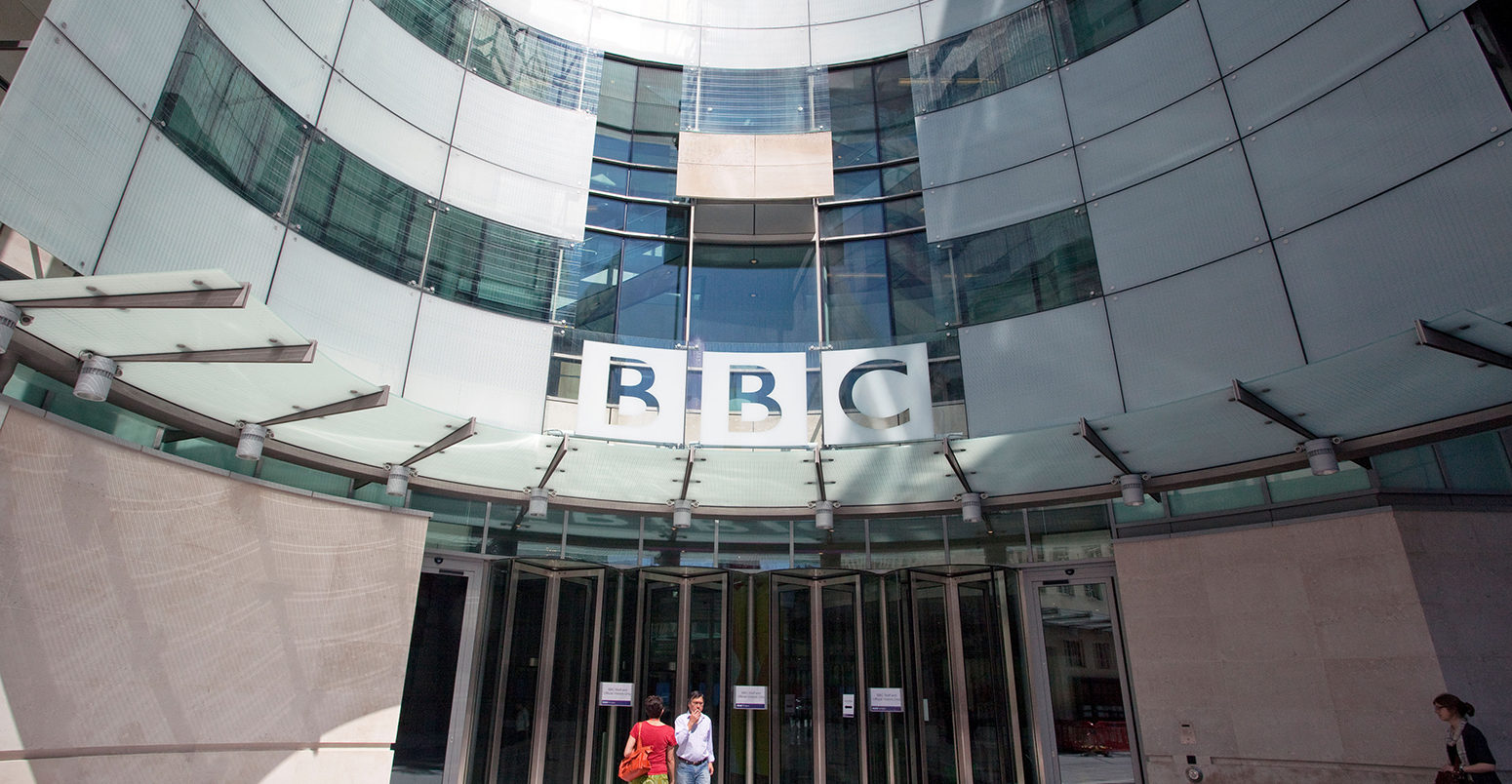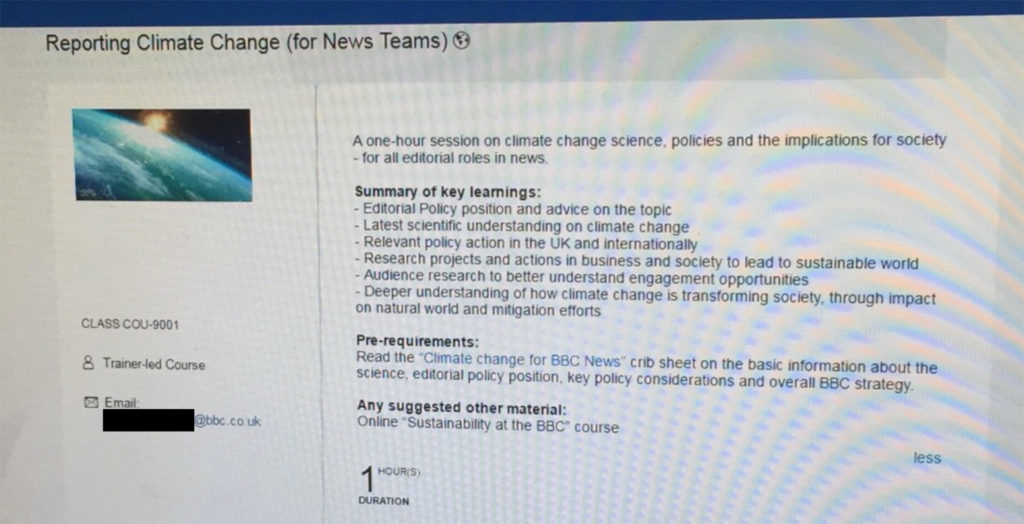
Exclusive: BBC issues internal guidance on how to report climate change
Leo Hickman
09.07.18Leo Hickman
07.09.2018 | 12:02pmThe BBC, one of the world’s largest and most respected news organisations, has issued formal guidance to its journalists on how to report climate change.
Carbon Brief has obtained the internal four-page “crib sheet” sent yesterday to BBC journalists via an email from Fran Unsworth, the BBC’s director of news and current affairs. The crib sheet includes the BBC’s “editorial policy” and “position” on climate change.
All of the BBC’s editorial staff have also been invited to sign up for a one-hour “training course on reporting climate change”. Carbon Brief understands this is the first time that the BBC has issued formal reporting guidance to its staff on this topic.
The move follows a ruling earlier this year by Ofcom, the UK’s broadcasting regulator, which found that BBC Radio 4’s flagship current-affairs programme Today had breached broadcasting rules by “not sufficiently challenging” Lord Lawson, the former Conservative chancellor.
Lawson, who chairs a UK-based climate-sceptic lobby group, had made false claims about climate change in an interview on Today in August 2017. Before Ofcom published its ruling in April, the BBC had already apologised for breaching its general editorial guidelines during the Lawson interview.
The broadcaster has faced repeated criticism over the past decade for enabling “false balance” on the topic of climate change, as well as for failing to fully implement the recommendations of the BBC Trust’s 2011 review into the “impartiality and accuracy of the BBC’s coverage of science”.
This is the email sent by Fran Unsworth to BBC journalists yesterday:
Dear all
After a summer of heatwaves, floods and extreme weather, environment stories have become front of mind for our audiences. There are a number of important related news events in the coming months – including the latest report from the UN Intergovernmental Panel on Climate Change and Green Great Britain Week in October – so there will be many more stories to cover. Younger audiences, in particular, have told us they’d like to see more journalism on the issue.
With this in mind, we are offering all editorial staff new training for reporting on climate change. The one hour course covers the latest science, policy, research, and misconceptions to challenge, giving you confidence to cover the topic accurately and knowledgeably.
Please book now by choosing a time from MyDevelopment (you’ll be prompted to login first), searching ‘reporting climate change’ on MyDevelopment, or emailing [email protected] to set up a tailored session for your team.
In the meantime, you can read the Climate Change for BBC News crib sheet, and the Analysis and Research website by searching ‘climate change’ which cover the basics.
I hope you find the training useful.
Fran
If a journalist clicks on the email’s link to book a place on the course, they are taken to this page on the BBC intranet:
(To avoid the risk of personal abuse or intimidation, Carbon Brief has decided to redact the email address of the BBC employee running the course. Carbon Brief can confirm, though, that the individual is not one of the BBC journalists who report on climate change.)
The crib sheet, below, includes a summary of the “basics” on climate science, the BBC’s “editorial policy” and “position” on climate change, and a precis of domestic climate policies in the UK as well as at the international level.
This is the document’s wording for the BBC’s “editorial policy” and “position” on climate change:
Editorial Policy
Climate change has been a difficult subject for the BBC, and we get coverage of it wrong too often. The climate science community is clear that humans have changed the climate, but specifically how is more difficult to evidence. For instance, there is very high confidence that there will be more extreme events – floods, droughts, heatwaves etc. – but attributing an individual event, such as the UK’s winter floods in 2013/2014, to climate change is much less certain.
We must also be careful to distinguish between the statements. For example: “Climate change makes this kind of event both more frequent and more severe,” and “Climate change caused this event”. The former uses previous scientific evidence to say ‘it is likely’ the event is the result of climate change, whereas the latter may be making an assertion without the proof to back it up.
What’s the BBC’s position?
- Man-made climate change exists: If the science proves it we should report it. The BBC accepts that the best science on the issue is the IPCC’s position, set out above.
- Be aware of ‘false balance’: As climate change is accepted as happening, you do not need a ‘denier’ to balance the debate. Although there are those who disagree with the IPCC’s position, very few of them now go so far as to deny that climate change is happening. To achieve impartiality, you do not need to include outright deniers of climate change in BBC coverage, in the same way you would not have someone denying that Manchester United won 2-0 last Saturday. The referee has spoken. However, the BBC does not exclude any shade of opinion from its output, and with appropriate challenge from a knowledgeable interviewer, there may be occasions to hear from a denier.
- There are occasions where contrarians and sceptics should be included within climate change and sustainability debates. These may include, for instance, debating the speed and intensity of what will happen in the future, or what policies government should adopt. Again, journalists need to be aware of the guest’s viewpoint and how to challenge it effectively. As with all topics, we must make clear to the audience which organisation the speaker represents, potentially how that group is funded and whether they are speaking with authority from a scientific perspective – in short, making their affiliations and previously expressed opinions clear.
The document concludes with a list of “common misconceptions” produced by the Science Media Centre (SMC). The list appears to be an adapted update of a document (pdf) published by the SMC in 2012.
The SMC was established in 2002 and seeks to “provide, for the benefit of the public and policymakers, accurate and evidence-based information about science and engineering through the media, particularly on controversial and headline news stories when most confusion and misinformation occurs”.
(For the same reasons stated above, Carbon Brief has decided to remove the metadata showing which BBC employee created the original document.)
Carbon Brief asked Prof Ed Hawkins to examine the crib sheet. Hawkins is a professor of climate science at the University of Reading and a lead author of the Intergovernmental Panel on Climate Change (IPCC)’s next assessment report due in 2021-22. Hawkins makes the follow observations:
- The IPCC report is not being updated later this year. It is publishing a special report on 1.5C. But this is minor detail.
- The definition of “climate change” could be improved, but isn’t wrong.
- The paragraph on projections is confusing and could be clarified to discuss that the level of future warming depends on our choices on future emissions. I also do not agree that there is a consensus on 2C of warming being “irreversible”.
- The “implications” section could do with a mention of heatwaves and intense rainfall.
- The “editorial policy” could be more explicit about what would constitute false balance in its coverage. In the past, too many inaccurate statements made about climate science have not been effectively challenged by the interviewer.
- Regarding the UK’s domestic stage, it could mention that emission cuts are already being made.
Hawkins adds:
“Overall, it’s great to see the BBC doing this. This set of BBC guidelines is long overdue. There have been too many occasions when the BBC’s audience has been misled over the realities of climate change.”
The BBC said it had nothing further to add in response to Carbon Brief’s request for comment.


